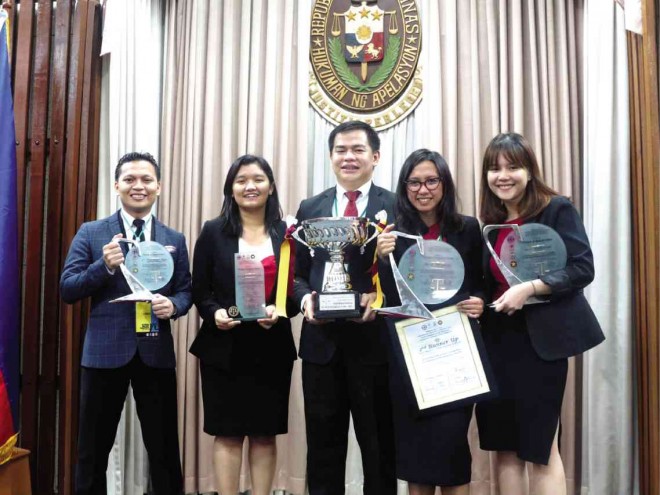For the first time in 10 years, the National Moot Court Competition on International Humanitarian Law (IHL) allowed non-law schools to participate.
Both the Philippine National Police Academy (PNPA) and Philippine Military Academy were invited but only the PNPA met the requirements in time to participate in the event organized by the Philippine Red Cross, International Committee of the Red Cross (ICRC) and the Court of Appeals.
The PNPA did not make it beyond the elimination rounds, but Evecar Cruz-Ferrer, ICRC legal adviser, said that was usual for first-timers.
“There’s nothing to lose here and we have everything to gain by just joining. I guess we were able to represent the academy well … [what we learned about IHL] and the knowledge we gained preparing for this exercise are things to be proud of,” said Juvi
Gayatao, PNPA’s coach, a former mooter who represented University of St. La Salle in Bacolod City. He said the experience felt like they had won a prize.
To Cadet Abner Zamora II of PNPA, the competition was linked to the infamous SAF 44 incident involving 44 members of the national police’s Special Action Force (SAF) killed in Mamasapano, Maguindanao province.
“There is indeed an IHL involved in that unfortunate incident and we should know the basics of it—command responsibility and protecting civilians and noncombatants during armed conflicts. And I think that’s a great part of fulfilling our duties as public safety officers,” Zamora said.
In the four-day battle of wits, participants were given the fictional case of “General Amir and the government of Alin.”
The University of the Philippines (UP) Diliman and Ateneo de Manila Law School faced off in the finals held in the chambers of the Court of Appeals.
Ateneo won the title and the right to represent the Philippines in the Asia-Pacific regional finals in Hong Kong.
Judges for the preliminary to semifinal rounds included SAF officer Supt. Darwin Padla, Akbayan Rep. Ibarra Gutierrez, Assistant Foreign Secretary Gary Domingo, former Commissioner Edilwasif Baddiri of the National Commission on Muslim Filipinos, and Col. Jose Antonio Carlos Motril.
Gutierrez said he was impressed by the students’ level of preparation and the amount of work they did. He said the participants did not study only the international criminal court statute but also cases that were relevant to the problem presented to them.
ICRC regional legal adviser Kelisiana Thynne credited the law schools for the students’ impressive knowledge of international laws.
But Thynne observed the participants’ tendency to veer away from the humanitarian impact of their cases, especially in the context of war and armed conflict.
“For example, the students were asked to look into whether somebody was responsible for the rape of civilians, and I think some of the arguments that they made were … ‘Oh he’s not responsible for rape,’ ‘It’s nothing serious, the violation of the laws. We don’t need to consider this’ when … rape is really a serious issue particularly in a war context. They could be a little more sensitive about some of the issues they were dealing with,” she said.
The competition started with the Role-Play Challenge, where the judges and students took on the roles of an ICRC delegate, a military officer and a member of a rebel group.
The simulation succeeded in showing how IHL could be applied in the real world and foster camaraderie among participants. The Hong Kong Red Cross International Humanitarian Law Moot has adopted the challenge.
Although the challenge was well-received, the role-play part had no bearing on the result of the moot court competition.
Judges for the final round were lawyer Lorna Kapunan, Polytechnic University of the Philippines (PUP) College of Law dean Gemy Lito Festin, Thynne and appellate court Justice Ricardo Rosario.
“Not all popular beliefs are correct,” Rosario said. He encouraged the participants to learn the difference between intelligence and goodness so they could tell if they were on the right track.
Kapunan said the case of the SAF 44 was a clear violation of the IHL. She said it was important for people, especially students of law, to be familiar with the IHL, but added that the participants’ mastery of the IHL was better than that of the people in the Senate, a remark that made the audience laugh.
Emmanuel Rey P. Cruz, coach of the winning Ateneo team, said, “From what I remember … Ateneo was the first school to win the competition back in 2005. It’s now the 10th year and Ateneo won it again … Ateneo has won three times.”
Cruz said they won because they recognized that participating schools were equally good and it made them work harder.
Gerard Contreras, one of the Ateneo mooters, said he was glad his “investment” paid off. “Last year I was a researcher for this so I guess [what I invested last year bore fruit this year].”
Silliman University won Best Memorial.
University of Batangas (UB), Ateneo de Manila Law School and Xavier University placed first, second and third, respectively, in the Role-Play Challenge.
The top three mooters were Crystal Gale Dampil (UB), Juan Paolo Datinguinoo (UB) and Diana Lou Boado (Ateneo).
The Best Mooter Final Round Award also went to Boado.
Among the 16 schools that participated, the following were outside Metro Manila: UB, Cagayan State University (Cagayan Valley), Southwestern University (Cebu City), University of San Agustin (Iloilo City), St. Louis University (Baguio City), Silliman University (Dumaguete City), University of St. La Salle, Cor Jesu College (Davao del Sur), University of San Jose Recoletos (Cebu), Xavier University (Zamboanga City) and Western Mindanao University (Zamboanga).
Metro Manila schools were UP Diliman, Ateneo, PUP and Far Eastern University.
